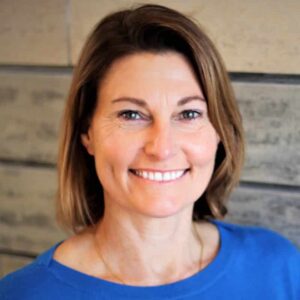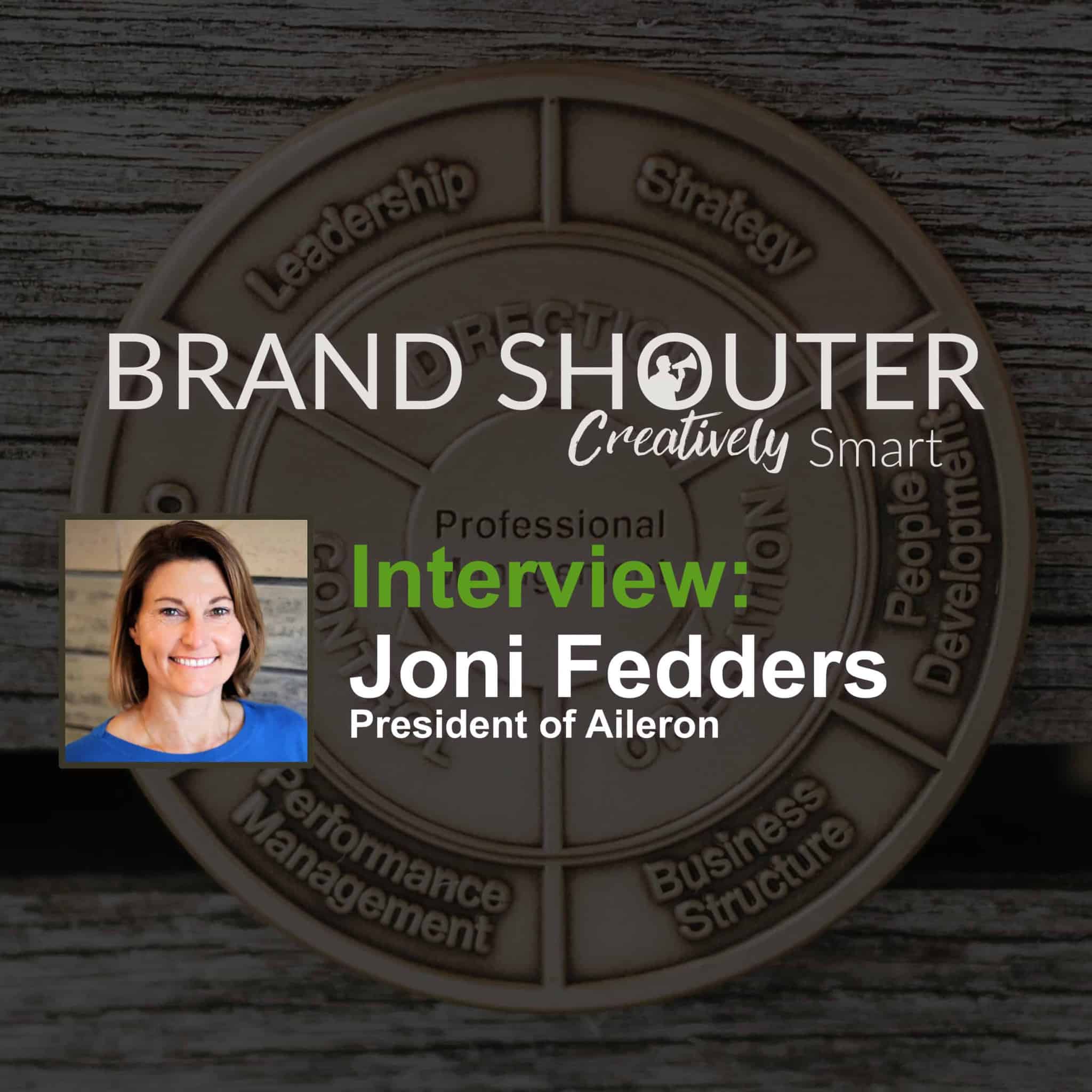
As a past business owner, Joni understands the risks, rewards, and challenges that ownership and professional management bring. She had the opportunity at Iams as a Brand Manager to live in a professionally managed organization where she saw firsthand how strategy, strong leadership and culture can fuel a company to do great things.
After Iams, Joni co-founded a technology services company and became an Aileron client herself, taking the Course for Presidents, establishing an outside Board of Directors and utilizing strategic planning. The company grew from 2 to 100 employees in five years, was a finalist for the Ernst & Young Cincinnati Entrepreneur of the Year award, and was named by the Cincinnati Business Courier as one of the 25 fastest growing companies in the region. After selling this business, she and her husband just couldn’t stop and bought a second business in decorative packaging that they operated for seven years before successfully selling.
The Interview:
Dan: I have Joni Fedders here with me. Joni is with a company called Aileron. Joni, can you tell me a little bit about yourself and about Aileron?
Joni: Absolutely! Aileron has been around for about 20 years. It was born out of the IAMS company and Clay Mathile. I had worked at the IAMS company, which was a dog and cat food company. It was such an energizing place to be. Clay knew early on that, in order to scale and grow, especially at the rate we were growing, we needed to develop people. We needed to provide an environment that would help people grow and develop. We started IAMS University.
Out of that, people were growing and developing. We had distributors as well that were trying to keep up with the same pace. A lot of those were family businesses. They joined in the learning through this IAMS University. Out of that Aileron was born to provide a space in an environment for people to grow and develop that was really targeted at business owners, their companies, and their teams.
As you're growing from a million to two million... 3 million... 6 million... 7 million... there's a lot that has to happen both from a professional management perspective as well as from a courage, growth and individual perspective. How do we raise the quality of life by supporting that personal growth?
We're an organization that's a non-profit started and founded by Clay Mathile. We are a National organization and work with companies across the country and help people uncover what it means to go to that next level and to get "unstuck" both personally and professionally as an organization.
Dan: Joni, I see that your title on the website is "President, Facilitator, and Leadership Coach." What is your specific role in the company?
Joni: I've been the president since day one. I was the first full-time employee. Now we probably have about 85 people engaged in the mission of Aileron. It's really fun. We talk about what our roles are versus titles. As you know today, there's career paths, but more than ever people are branching out to do what they want. Titles aren't as important as the role that you play. I've learned that my role has had to change over time.
Initially, it was probably more about understanding how to work with clients, find out what they need, investigate what a business owner needs to go to the next level, how do we price things, how do we act as a non-profit? Over time you start to realize that your value is starting to look longer term at the organization. We ask questions like, "How do we make this a sustainable organization?" and "How do you grow and develop people?" and "How do you put the systems in play for us to be healthy organization while we're also helping others become healthy organizations?"
So that's kind of my job. I love facilitation and leadership coaching because the belief is that the wisdom is in the individual that you're working with. You aren't necessarily the smartest person or have the right information for them. It's more about how you ask the best questions and get them to think, reflect, and pull out their thought process. I officially was trained and became a leadership coach through a certification program and a facilitator. For the organization, I help with growth, strategic planning and things like that - but also facilitate. I feel like a facilitator of good conversation.
Dan: I like that. To echo what you've said; the idea of not being the expert necessarily, but instead being a support to somebody who's already an expert in their industry is not an approach that a lot of people take anymore. It's all about "me" and "I know what I'm doing." and "Listen to me." So, I really like that.
Joni: Margie Blanchard is on our board and her husband has written 60 or 70 books about management and leadership. She runs the Blanchard companies and now she's in a role called "Office of the Future." If you look at their core offering around situational leadership, it tells me that people go through phases in their development. In order for me to develop to learn how to cook or to ride a bike or to write a good business memo, I start off as a very eager learner, but I have no idea what I need to do. In that situation, I need much more advice and expertise. But, as I start to become better, I need more coaching and more of a support piece.
It teaches you to be situational and I do think lot of people get stuck in thinking their value is only in giving advice or in being the expert which is valuable in certain cases. In many cases however, it's more about facilitating.
Dan: I find that the average business owner, even when they're stuck and are unsure of where to go next, they already know the answer. They already know where to go next. In the same way, with marketing, you can see things through your own lens and you forget to look at them from a customer's perspective.
Joni: Right. The other thing that's really interesting is, in leadership coaching, they talk about acknowledging and validating. Acknowledging is literally playing back what you just heard to somebody. Sometimes people think that it's just repeating their words and it feels like I'm mimicking them or not really adding value.
If you've ever had somebody do that really well, you all of a sudden hear your own words and go, "Oh, yeah, that's what I was struggling with!" It's literally what you said, they just help you hear them.
Dan: I've spent a bit of time researching Aileron. I wanted to read this from the "about us" page on your website quickly and then I'll get back to you.
It says: "We want to see you shape your business into everything you want it to be. Your business is an extension of you, your commitment and your dreams." This plays right into what you were talking about. "You’re earning a trusted name, you're building relationships and you're fulfilling a dream. You started the movement. We're here to help you keep it moving."
And then specifically, I really liked this paragraph: "As a business owner, company president, or CEO, your entrepreneurship and commitment make you a special breed. We're committed to that entrepreneurial spirit and want you to get results no matter what your business goals are."
That small paragraph spoke to me. That's the arena that I hope to live in as well in being committed to the entrepreneurial spirit and being a support to others as they try to grow their business, increase their wealth and increase their effectiveness on the world.
I kind of say that as a segue into my next question for you. We've talked a little bit about the mission of Aileron. I'm wondering what are Aileron's goals beyond what's plainly spelled out on your website?
Joni: At the end of the day, the reason why we exist is to raise the quality of life in America. There's a strong belief in the entrepreneurial spirit that a lot of the wealth – not just in money, but wealth in freedom, innovation, the taxes that are paid in the local communities, the culture – that a lot of the jobs are really supported by this entrepreneurial group that's in the middle. You have some very large companies, and those are needed, and you have some very small companies. Around 70% of our jobs are with companies between ten and a hundred people. We believe that raises the quality of life by helping them thrive. Really the mission is to unleash the hearts and minds of people and help them grow/develop.
If you look at our priority issues, it's really to engage people in this community, to help people develop in the things that will be sustainable/effective, and then to last forever. That means we have to do it in a way that's sustainable. Those really are three priority issues as far as our strategic plan goes. If we do those three things well, hopefully that's going to continue to produce a growing and engaging community that continue to support each other and develop.
Dan: Cool. I love that wording: "Unleash the Hearts and Minds." For anybody in business, that's ultimately what they're doing. They're pouring their hearts and minds into what it is that they're doing.
We've talked a little bit about Aileron here. Now, if it's okay with you, can I take this a little to your personal goals?
Joni: Sure.
Dan: What are your personal goals? Are they directly entwined with Aileron or do you have other personal goals as well?
Joni: I have a ton of goals and I love being at Aileron and I continue to love being part of Aileron because you're working shoulder-to-shoulder with other people focusing on learning and growing. If there's anything that I'd love to continue to do it's to continue to learn and grow every day. That’s what's really fun - both personally and professionally - is to be a part of new "Aha's". We work a lot with our clients saying, "We're learning this right here right here with you." They help us figure out the answers and where to go. So certainly, being in an environment like that for a long time is one of my goals.
We unpacked our dreams at a retreat recently and had some different categories. It was kind of a fun way to do it. If I think about spiritual, intellectual or emotional goals/dreams - however, you want to do it. By unpacking those, I was quite honestly surprised. And some of them you call bucket list items like traveling. I'd like to go to all the national parks in the country and explore the West. Some of them are intellectual from the standpoint of staying relevant using technology, which is a challenge.
I've used Microsoft forever, but man, there's a lot of new things to learn. So how do you continue to keep growing? In that, I certainly have personal passions of mine. We're a kidney transplant family and we're passionate about children. How could you maybe take some of the things you've learned towards growing strong organizations and apply to some of those causes. I think I could go on and on...
How about you? Do you have any?
Dan: You and I kind of chatted a little bit before we started this. I'm one of those people who are constantly trying to figure out what the definition of work-life-spiritual balance is. I don't believe that there's a teeter-totter that you have to try to balance. I believe that there are seasons. For me, my family is always kind of my overriding driving force. On top of that, I have this crazy desire to help other people. Which is why marketing is so much fun for me. It's the intersection of making money and helping other people make money at the same time.
It's kind of a weird way of answering that question but my personal goal is to just keep doing what I'm doing. I've never been as fulfilled in life as I am now and what I’m doing is driving me day-to-day.
Joni: That's awesome, which means you've tapped in to your value and some intrinsic motivation.
It feels like someone used this word yesterday. Instead of the work-life balance, it’s the work-life integration. We have more opportunity than ever to integrate both of those together and it feels good. It feels like it's the way it should be. Rather than trying to separate them and cram things into eight hours here or you know, 16 hours there.
Dan: I released a podcast episode a couple of weeks ago called, "What's Your Why, Your Purpose.” I'm not a millennial but I think that's one thing that the Millennials are starting to figure out what previous generations didn't: doing things because they give you fulfillment more than money.
I think that's an important piece of business in general. You shouldn't just grab something that makes a quick buck. Instead you should find a way to make money while also being fulfilled in what you do.
One of the purposes for my podcast is that I'm always trying to provide something useful to small business people. I really would like to hear about some challenges that you had to face and had to overcome.
Joni: Yeah, where do I start? There's challenges of all different sizes all the time. We're always trying to overcome something. I'd say one of the biggest ones that probably happened maybe five or six years ago was becoming more of a conscious leader/ individual in how I think about things and then how that plays out in action. It's kind of interesting - we have unwritten rules in our head that we live by. You're kind of on autopilot because of these rules. For example, you automatically put your seatbelt on when you get in the car. Obviously, that's a good one.
But then there are rules that maybe aren't as visible. "I can't trust people that I work with, so I shouldn't delegate," or "They won't do it as well as I can." So, there's this thing that goes on in our heads all day where a thought creates an emotion which creates an action. You can go through the day being unaware of what those rules are, or you can start to become more aware of them.
I think I was always feeling like I needed to help people, and that I was capable, and I could reach in and do things faster. If someone calls and says, "I need help," I'd be like "Great, I'll help get that done." Over time, I started to realize that I actually could have been stealing from others in that - if you're always doing something for somebody else, you're almost sending a message to them that they're not capable of doing it themselves. So, you're robbing them of confidence or the opportunity to actually grow and learn themselves.
If you experience people always coming to ask you for help or advice, or all of a sudden, you feel like everything's landing on your plate, you should check yourself to see if you’re doing the most helpful thing.
So that was a challenge, to start to change my thoughts and start believing that it was good for other people to struggle and take on things. It was good to let go. I learned so much. It's becoming more conscious to those kinds of thoughts. That was one internal challenge that I went through probably five or six years ago.
Dan: From my experience, that resonates with listeners of this podcast. I also experienced this in my past life. This was something I had to learn, and it was as painful as ripping a Band-Aid off of a fresh wound.
It's really hard to delegate because, in your mind, you have this idea that "Only I can do it right." Letting go and trusting somebody else can be very important. And just because they don't do it the same way as you would, it doesn't mean that they're doing it worse. This becomes more important especially as you transition from a very small business to one that is experiencing growth. That delegation becomes a necessity, or you end up strangling your business.
Joni: Yeah, I remember I was at a program and someone was asking about it like, "I'm just swamped, and I can't get work done." After you start to grow to 10, 15, 20 people, you have to learn to work through others. I mean, if you have a big team you have to learn to work through others.
I remember saying to a woman in the past, "Well, it's not right that I would ask somebody else to do that. I can do my own calendar." She looked right at me and she said, "That's a really arrogant thing to say!" I thought I was being humble or like I couldn't ask somebody to do something that I could do. That would be demeaning to them. She then said, "You're assuming that you're just as good as somebody else at doing that. I promise you there's probably people that are much better than you at doing calendars and organizing things and project managing."
And she was absolutely right. I'm terrible in project management. I was judging it as demeaning work when it really wasn't. It was really interesting when she said that. It just made me sit back in my chair and go, "Wow!"
Dan: That's such an interesting point. I would say that I'd probably fall into the same pitfall. I don't stop and think that the way you approach something like that could end up totally demeaning someone else. It's interesting.
Joni, what brings you the most Joy? Where do you find your sweet spot in what you do?
Joni: Family is right up there at the top of the list. We have a large family on both sides that we're really connected with. I have children and I'm pleased to say that we go to our in-laws for Sunday dinners and my kids know all 35 of their cousins. They go on vacations together. So, family is right up there as far as that goes.
Being a conscious friend/thought partner with people brings me a lot of joy. Rather than taking the responsibility for fixing things for others, I'm hopefully able to help them get there. I feel like I can do that through coaching, facilitation, friendship, conversations, learning, and exploring creativity. Like you, I feel like there's a lot of opportunity to experience joy and it's fun.
We tripped upon some of the Deming work 4 or 5 years ago and at the end of the day his whole theory was, "How do people find joy in the work?" Rather than just getting the work done, there's a way to work together where we can enjoy it. We've had a lot of businesses that don't like their own cultures and they don't like what they've created. It's draining on them. It's really fun to see how they can turn that around to create places that they like to be.
Dan: That's cool. I like that. Joni, if you had one piece of advice that you could offer to other businesses what would that be?
Joni: Don't get in automatic. Set up processes and ongoing ways to grow your people and develop yourself as a leader. Look long-term at where your business is going what you're doing to evolve the structure and the business models. Find a purpose and connect to your values on why you're doing it.
I know that's a lot of things, but at the end of the day, it's becoming a very conscious leader and being engaged in more purposeful, intentional ways about running a business.
Dan: Yeah, I think one of the themes I'm getting from a few of your answers is intention - taking the time to stop and think through things rather than just going on autopilot is a big piece. So many of us live our lives on autopilot and I'm guilty of this too.
Joni, if you were talking to somebody who's interested in Aileron how would you explain Aileron to them?
Joni: Yeah. It's a community that you can join as a business owner or a member of a team that's trying to grow an organization. It's a community with workshops and resources and thought partners that help you take your business or yourself to the next level. That means seeing practices and ongoing processes that help you do that, as well as getting "unstuck." A lot of the answers are already within you. Our community has already done great jobs. They are already running good businesses. But there's places where you get stuck or things need to be thought through. I think that's what we're here for: to help you do that through tools, business advisors, or a course for presidents where you get with other peers and talk through the role of a business owner and how it keeps changing, the "pulls" on it both ways - the pains and gains.
We're a non-profit. Our profit is in people's success.
Dan: Well Joni, thank you so much. I appreciate your time.
Joni: Wonderful. Thanks.








